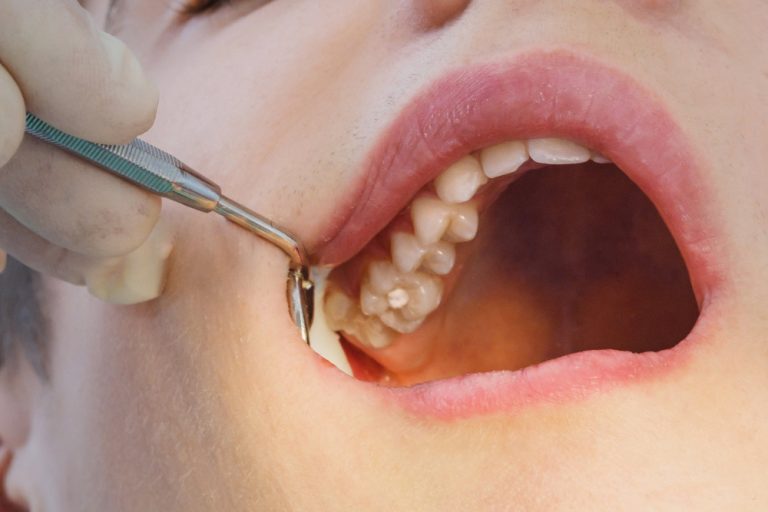If the jaw does not have enough space for the wisdom teeth to come through, the tooth will become wedged in or “impacted” and may cause severe problems.
If wisdom teeth cause problems they must be removed. If your wisdom teeth are likely to be very difficult or complicated to remove, your dentist may refer you to an oral and maxillofacial surgeon.
The decision to remove teeth
After inspecting your mouth, jaws and x-ray films, your dentist may recommend early removal of one or more wisdom teeth due to the following reasons:
- There is not enough room for the teeth to push through.
- You need orthodontic work, and the remaining teeth must not be crowded by wisdom teeth.
- The tooth has stated to cause trouble. It should be removed soon so that pain, infection or other problems do not get worse.
Problems caused by impacted wisdom teeth
Infection can cause bad breath an unpleasant taste, pain, swelling and jaw stiffness. Swallowing may be painful. The person may feel generally unwell.
Crowding: A wisdom tooth may push nearby teeth out of their correct position.
Pain: Pressure from the wisdom teeth may cause pain in the tooth next to it.
Cyst: If a wisdom tooth is not removed, a sec of fluid called cyst can form around the tooth and may displace the tooth. The cyst can destroy bone and damage other teeth and the gums.
Ulcer: An upper wisdom tooth may push sideways out of the gum. It may cause an ulcer where it rubs against the inside of the cheek.
A food trap: Food becomes trapped between the wisdom tooth and the molar next to it. This can cause cavities in both teeth.
Resorption cavity: An impacted wisdom tooth may keep pushing against the molar next to it. This can cause a Resorption cavity where the wisdom tooth hits the other molar
Treatment of infection
Your dentist may gently clean the infection area around the tooth. Your dentist may prescribe antibiotics, suggest a disinfectant mouthwash and a pain killer.
If a lower wisdom tooth is infected, it can be made worse by the upper wisdom tooth biting down on to the gums. The patient can be helped by removal of the upper wisdom tooth.
Removal of the wisdom teeth
Your dentist will have to make an incision to open your gums to remove the wisdom teeth. A small portion of the bone may have to be removed so your dentist can get to the tooth. The tooth may have to be divided into segments so is can be removed easily and safely. The incision in your gums may have to be closed with stitches. Some stitches dissolves after a few days. Other stitches will be removed by your dentist.
Possible complications of wisdom tooth surgery
All surgery carries some degree of risks. Most patients will not have complications, but if you have concerns about possible complication, discuss them with your dentist. Normal conditions after wisdom tooth surgery
- Pain,
- Swelling
- limited jaw opening
- The following may be possible complications
- Numbness or altered sensation: When the tooth is removed sometimes the nerve may become bruised. This can cause numbness, tingling and loss of feeling in the tooth, gums, cheeks, lips, chin and tongue and around the upper and lower jaw. If a nerve in injured it usually will heal in four to eight weeks. This may take 6 to 18 months. In rare cases, the nerve may not heal completely, and the numbness or altered sensation may be permanent.
- Never damage causing pain: in rare cases, an injured nerve may heal poorly, and pain may persist or recur without diminishing. The pain in these cases can sometimes be difficult to treat.
- Dry socket: A blood clot is important for proper healing and relief of pain. If the blood clot is washed away or dissolves, the bone will be exposed. This is called a dry socket.
- Infection: an infection in the gum or bone is usually treated with antibiotics. Tell your dentist if you have ever had an allergic reaction to any antibiotics or other drug. Take the complete course.
- Fever
- Excessive bleeding (hemorrhage):
- Damage to nearby tooth or fillings:
- Sinus Problems: In some cases, a sinus may be opened when a wisdom tooth is removed.
- Weak jaw: removal of a wisdom tooth can cause the jaw bone to become temporarily weaker

